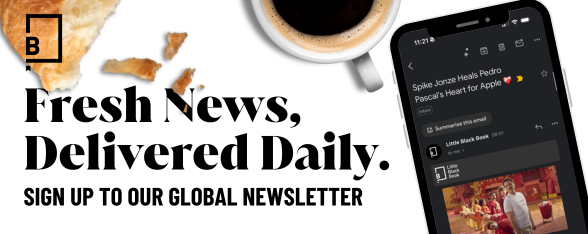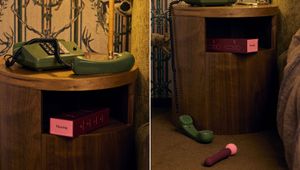
Firebrand: Nathalie Parte and Creative Savoir Faire

When Nathalie Parte got her first job, the very first vacation that she paid for herself was a trip to Cuba. There she fell in love with the people, the music, the culture… the rum. That cubanía of it all was heady, romantic, intoxicating.
Little did Nathalie know that this youthful adventure would lay the foundation for a fantastic career move 18 years later.
Earlier this year, Nathalie was named global marketing director for Havana Club, the iconic rum brand that’s part owned by Pernod Ricard and the Cuban government. Of course, one of the first things she did in the new role was to head to Havana to reconnect with the culture and to ‘measure the pulse of the brand’, as well as reacquainting herself with the local pride in the brand.
And you can bet Nathalie will be leaning in hard to the Havana Club’s heritage. “I think we are very lucky to have this incredible brand which is rooted in the country of origin, in Cuba, and I as a marketeer strongly believe that it’s a strength because it means that you’re proud of your roots and your richness,” says Nathalie. “So, I think it’s very important to continue and to go even further to communicate the heritage of the brand, the know-how of our maestros.”
(Indeed, those ‘Maestros del Ron Cubano’ - the rum equivalent of a master distiller - are so skilled and steeped in traditional know-how that in 2022 they were recognised by UNESCO as an example of World Intangible Heritage.)
Before taking on this new global role, Nathalie was the brand director at Pernod Ricard France and before that she worked for Martell, taking cognac to markets as different as the United States and China. And so not only is Nathalie au fait with the spirits industry, she’s also particularly experienced in the ‘intellectual gymnastics’ of taking a unique brand and figuring out how to express it and make it relevant to different audiences.
“I think that something I really, truly love is expressing the unique DNA of a brand. Because most of the time I have worked for brands which are old brands with a heritage, with a point of view, with an anchorage, with a richness and so on,” says Nathalie. “Managing to express the unique DNA of the brand and share it with consumers in a very appealing way is what drives me every morning, because it’s infinite. You can express it in a product, or you can express it in packaging, in a campaign, in an activation, and when you succeed that’s where you can really have an impact on the brand.”
Havana Club’s heritage and strong DNA is something that Nathalie believes will stand the brand in good stead in a time when the rum category itself is proving to be uniquely dynamic and when consumers in many markets are struggling with inflation and the cost of living.
On the first point, rum is seeing more new entrants from across the world and far beyond the Caribbean, where it is believed to have originated - and the whole sector is seeing a trend towards premiumisation. “I see it as an opportunity because we have the skills and the strength to count within the segment,” says Nathalie, who says that Havana Club’s tight relationship with the bartending community is key to navigating and shining in this vibrant - if crowded - space. As consumers seek out novelty and unique experiences, Havana Club is able to leverage its association with rum cocktails thanks to both its own brand story and that aforementioned connection with bartenders.
And although new players are entering the scene, Nathalie believes Havana Club has the strength and reliability to give careful consumers exactly what they’re looking for. “I think we have to face the same challenges as the others, which is a difficult and challenging economic context and the fact that actually the consumers, because of inflation, are obliged to reduce their spend,” says Nathalie. “What I saw in France, on a day-to-day basis, is in that type of moment, you go back to more affordable luxury, but you also go back to very strong brands. There is a bit of a refuge moment and if your brand is strong, if your brand is authentic and has managed to build this emotional connection, it’s where the consumer wants to go back to. I think Havana Club is definitely a brand that has this authenticity, this credibility deep inside, but that’s definitely a challenge right now.”
And when consumers are looking for strong and authentic brands, creativity is key. “I think it’s more than important, it’s completely necessary because there are so many brands and so many campaigns that if you don’t push your creativity, it’s very difficult to just be seen and to exist. But I think the creativity should not be fake and it needs to serve a purpose. It’s not creativity for the sake of it. And that’s where I think Havana Club is very strong, because the creativity of the brand is deeply rooted in its story.”
Thankfully, with Havana Club, creativity runs deep. Nathalie waxes lyrical about ‘cubanía’, a word commonly used in Cuba to talk about the vibes of the culture. According to Nathalie it’s “this super creative energy, very dynamic like the Cuban people. The people are really full of resourcefulness when it comes to creativity - recreate, repurpose, rebuild and this is something which I think is very deep in the brand.”
The brand works closely with the creative agency Sid Lee and youth culture agency Yard to help unlock that Cuban creativity. “I think it reflects well on the authenticity of the people when they work together. So they’re not only a business partner, it’s also become a true relationship. Our partners actually care about the brand as much as we do.”
When it comes to creativity and the emotion of marketing, Nathalie is passionate. So it may come as a surprise that Nathalie didn’t come to the marketing world from an explicitly creative background. Before finding her calling, Nathalie studied engineering - and all of her friends from university are ‘true engineers’. But as Nathalie studied, she realised that she was far more interested in why a particular product had been made rather than how. Why does one brand become iconic where another doesn’t? Why does a product work for consumers?
Those questions led Nathalie to the marketing world and she started out on the insights and analysis side as an international market research manager at Parfums Christian Dior. And, as much as Nathalie didn’t want to become an engineer, she’s found that the engineering background has served her well. Not only has it given her those analytic skills, it’s also enabled her to connect with the other teams beyond marketing. “I have a different background from a general marketer, and maybe it has also helped me to interact very easily with people with different backgrounds,” she reflects. “When you are working for a brand, whether you are in a market or in an international team (and it’s something that I love), in the same day you will talk to legal, you talk to finance, production, creative, the maestros and I guess this agility is down to the fact that I have two backgrounds.”
Nathalie says she’s always been driven to work for brands that have a ‘very deep savoir faire’ and a huge emotional value. She found that first in the fragrance world, and she’s found that it’s a sector that has a surprising commonality with the world of fine spirits.
“It was a luxury fragrance, so the way you elaborate the fragrance is very important. The raw materials that you use are very important,” reflects Nathalie, who points out that just as rum has its maestros, who are knowledgeable and passionate, the fragrance world has ‘the nose’.
It’s also an incredibly emotional category. “Fragrance is a very emotional product, super emotional. It’s also important culturally. So you can have very strong differences from one market to the other. One consumer to the other. And fragrance is also part of your personality. So it’s really something very close to the culture, and it definitely shares this with the spirit industry.”
That emotion and the deep connection that consumers can feel with brands in these sectors is exhilarating - and it also pushes marketers to maintain the highest standards and to respect and reward that connection. After all, not all categories can boast such an emotionally-charged relationship between consumer, brand and product - and nor do they have those brands with such rich heritage and histories.
One of the challenges that marketers face when they are working with those historic brands, as Nathalie explains, is to be able to leverage that heritage without being weighed down by it.
“I think it’s part of our jobs to constantly adapt. But… it has come quicker and quicker. You need to be very aware of the trends, you also need to take the pulse of the markets and of the consumer all the time and to understand the change between the generations,” says Nathalie. “But at the same time as you’re doing it, while always staying true to who you are because the worst here would be to completely reinvent yourself to follow a trend.”
Nathalie is fascinated by generational change, and she says that guiding a brand through that balancing act of keeping it fresh while keeping it true is one of the things that she enjoys most about her role. Back when she worked at Martell Mumm Perrier-Jouet she worked on Martell Cordon Bleu cognac, a product that was first launched in 1912.
“Take Chanel No. 5, for example, in the fragrance industry: every iconic product, to stay iconic, is retouched and is evolving all the time. They need to renew but at the same time they need to remain iconic, and that’s a very challenging task and it makes you feel very humble because as a marketeer, you realise that you are really responsible for and need to respect all the years before you”, she explains. “At the same time, you need to really continue to nurture the DNA of the product and make it relevant for the next generation.”
At Havana Club, with its vibrant Cuban vibes and a 90-year history that stretches back to 1934, Nathalie’s got that complex dance ahead of her - though with the irresistible mambo rhythms of Cuba to guide her steps, it looks like she is going to have a lot of fun with it.















